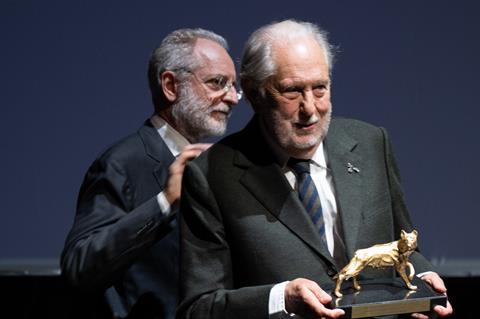
Oscar-winning UK producer David Puttnam, fuelled by his irrefutable passion for cinema, pulled no punches during a lively and anecdote-filled conversation with collaborator, friend and fellow cinephile, the UK director Uberto Pasolini at the Rome Film Festival last week.
Puttnam won the best film Oscar for Chariots Of Fire, directed by Hugh Hudson, in 1982.
Under the moniker the Paso Doble, described by the festival as a space dedicated to dialogue between two auteurs, the veteran duo talked AI, offered small crumbs of comfort for the next generation of producers, and pondered why the next generation of filmmakers have one less big-budget headache than when he was producing.
Puttnam and Pasolini worked together for over 10 years on films starting with 1985’s Oscar-nominated The Killing Fields – “best tea boy in the world,” joked Puttnam of Pasolini, for whom it was one of his first jobs in the film industry. Pasolini had started his career in banking, as Puttnam had in advertising.
“Uberto was the first person to leave the financial world behind and join the movie world. How smart is that?” Puttnam asked.
“Not smart. I could be rich if I had stayed a banker,” replied Pasolini wryly. “We are not here to discuss me. We are here to talk about David’s career.”
It set the tone for the discussion largely centered around a trio of Puttnam-produced films: Roland Joffé’s The Killing Fields, The Mission in 1987 also directed by Joffé and Hudson’s Chariots Of Fire.
However, Puttnam said it was Bill Forsyth’s Local Hero, the small film that came directly after Chariots Of Fire, that was “as close to perfection as any of them get,” describing how it had survived a bad test screening.
“Bill and I were pretty depressed,” Puttnam recalled. Forsyth took all the comment cards to bed and over breakfast, told Puttnam he had worked out the problem with the film. “He said, ‘The people that don’t like our film can’t spell, and I’m not making movies for people who can’t spell’.”
Puttnam said it was a lesson learned about what to take from preview screening reactions. “We decided only to look for an audience who could spell.”
He said coming from the UK advertising industry – at the same time as Ridley Scott, Alan Parker and Hudson – meant “there’s never been a moment in my career when I wasn’t trying to reach an audience”.
Growing up the son of a war correspondent in a household immersed in newsprint journalism informed his choices of material. The Killing Fields came from a New York Times article about a journalist reunited with his Cambodian interpreter during Pol Pot’s bloody Year Zero cleansing campaign.
There were tales of production peril, with The Mission front and centre: non-cooperative weather on location in Colombia and making the mistake of building an entire village too close to a waterfall meant the set was washed away overnight. An infestation of rats at the second village set nearly shut production down before Puttnam was offered the services of a shaman to banish them. “He talked to them and persuaded them to leave, which they did,” he explained.
For The Mission, Joffé shot 600,000 feet of film over 14 weeks with over 1,000 setups. “What a young filmmaker forgets is when we started making a movie, until about the mid-1990s the biggest single item on the budget was film,” Puttnam noted. “It was all about how much film you could afford, and so your budget was constructed around your use of film. Now it’s not even a consideration.”
That at least is one less barrier for filmmakers now, Puttnam and Pasolini agreed.
“It is now possible to get your vision onto a screen at an affordable price. You don’t have to go through the rigmarole that we went through, buying your film, finding distribution,” said Puttnam. “You can now actually make your film, get it onto YouTube, and people will see it. If your ideas are viewed by other people, and are strong enough, they’ll get picked up.”
The duo reflected on the possible impact of AI on film and cinema. Puttnam said the industry must learn from the introduction of social media.
“If you go back about 10, 12 years, social media emerged, and many of us, myself included, had high hopes. We now know that it has done some very interesting things in connecting people. But it’s also very damaging,” he suggested. “If we’re stupid enough as a species to not learn the lessons that we should have learned from the introduction of social media, and then apply them to AI, then we’re very, very dumb creatures indeed.
“One thing we know about AI is it doesn’t have any imagination,” he added, to a round of applause from the auditorium.
Puttnam is the recipient of the Rome Film Festival’s inaugural Industry Achievement award, established to pay homage to personalities in the global film industry who, through their memorable careers, have left an indelible mark on the history of the seventh art. Pasolini presented Puttnam with the award the night before the Paso Doble conversation.
The festival’s history of cinema section hosted a retrospective of Local Hero, The Mission and Chariots of Fire.















![[L-R]: Amanda Villavieja, Laia Casanovas, Yasmina Praderas](https://d1nslcd7m2225b.cloudfront.net/Pictures/274x183/6/4/1/1471641_pxl_20251224_103354743_618426_crop.jpg)








![[L-R]: Amanda Villavieja, Laia Casanovas, Yasmina Praderas](https://d1nslcd7m2225b.cloudfront.net/Pictures/100x67/6/4/1/1471641_pxl_20251224_103354743_618426_crop.jpg)
No comments yet